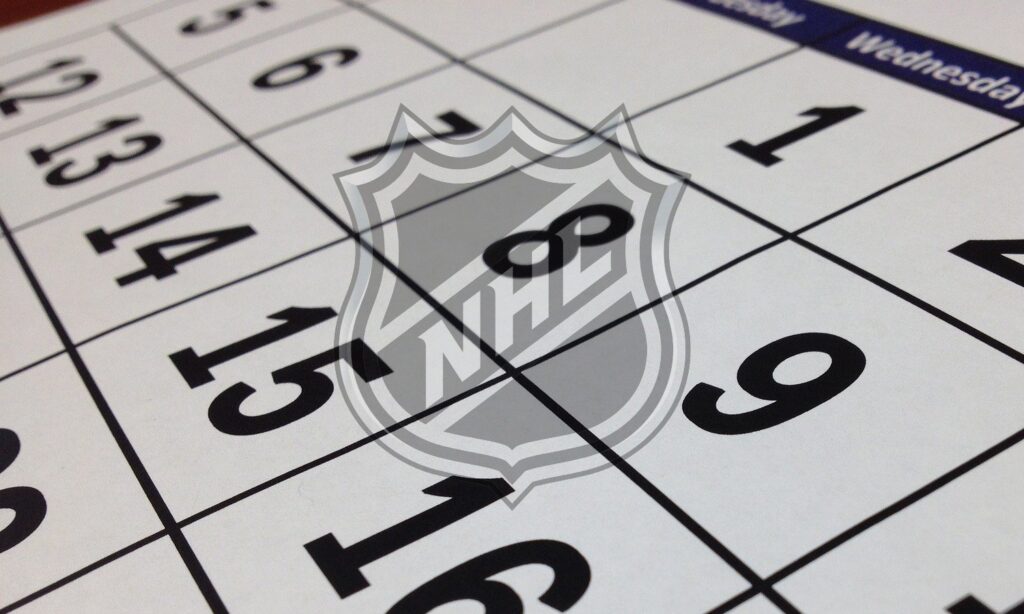Whether it’s the start, middle or end of the season, you might have questions about the NHL schedule.
Maybe you want to know the length of the grueling hockey season.
Or maybe it’s coming down to the wire and you want to find out if you’re team will make it to the playoffs.
Although the NHL has been dead set on a specific count for many years now, the total games played is not always guaranteed.
Anything from COVID to lockouts have disrupted the calendar year every now and then.
But before we get into the nitty gritty, let’s start by answering the question you came here for.
How many Hockey Games in a Season?
Each NHL team plays 82 games during the regular season, which normally runs from October to April. Following the regular season, 16 teams qualify for the playoffs based on their classification in the standings. Playoff teams compete in an elimination tournament and can play anywhere from 4 to 28 additional games.
Keep in mind that teams also play preseason games and that will factor in the total number of games played, regardless of their importance.
In the end, the NHL season length will vary for each team.
But, to get an idea of the full extent of the calendar year, let me give you the first and last date of the NHL 2021-22 season.
The very first preseason day games took place on September 25, 2021.
At the opposite end, the Tampa Bay Lightning played the very last playoff game against the New York Rangers on June 11, 2022.
The Lightning won the Stanley Cup final in 6 games, officially beating the Rangers 4-2 in the series.
So, it was still possible for the season to finish at a later date.
And according to the preset Stanley Cup final schedule, the last game would have taken place on June 14, 2022.
Given an 82-game NHL season, the start and end dates will vary from year to year.
This is typically due to venue availability and playoff length.
Furthermore, in the past, the NHL would take time off for player participation in the Winter Olympics.
How many Home Games?
NHL teams play 41 home games during the season.
Which means that teams play an equal amount of home (41) and away (41) games for the length of the regular season.
If you include the preseason and playoffs, the overall number of both home and away games will increase, but not necessarily equally.
That's because teams may play an uneven amount of home and away games during preseason.
Meanwhile, the distribution of home and away games in playoffs is slightly more complex.
First off, each playoff series is a best-of-seven, first to 4 wins format.
The team ranked higher in each round will play up to 4 home games vs 3 away games max.
And not every playoff series goes the distance (7 games).
How many Preseason Games?
During the last 2 weeks of September, teams play between 6-8 preseason (or exhibition) games.
This allows the coaching staff time to evaluate new players and get their established players back up to game shape.
In this case, new players can better be described as rookies, draft picks, players from an affiliate team or recently signed to their first NHL contract.
The idea is to give them an opportunity to win a spot on opening day roster and challenge already established players.
As a reminder, preseason has no effect on the team standings.
So, while players must put in the effort, these games are not valid towards playoff qualifications.
How many Playoff Games?
As mentioned earlier, playoff teams can play anywhere from 4 to 28 games in the playoffs.
There are four best-of-7 elimination rounds in the playoffs. The first team to win 4 games will continue on to the next round.
So, if a team loses the first 4 games in the opening round of the playoffs, they are eliminated from competition and the other team advances onto round 2.
Meanwhile, a team can play all 7 games in each round, win those series by a 4-3 margin and totaling 28 games played.
The same could be happen to the Stanley Cup Final runner up, except that they lost the last series 4-3.
Keep in mind that the Stanley Cup Champions end up winning 16 games throughout the playoffs.
If you'd like to learn more about how teams qualify for the playoffs, make sure to check out my blog post here.
How many Games Played Combined?
In an 82-game season, the NHL schedules 1,312 regular season games for all thirty-two teams combined.
The math is simple:
(82 games x 32 teams)/2 = 1,312 games
*We divide by 2 because every team must face one another.
Games Played by Season Since the Expansion Era (1967- present)
The NHL did not always follow an 82-game calendar.
Since the 1967-68 season, teams played anywhere from 48-84 games in a season.
The first 48-game season took place due to the first of 3 modern-era lockouts. This was back in 1994-95.
The following season, in 1995-96, the NHL switched to the 82-game format for the first time.
The other two lockouts saw a full season cancelled (2004-05) and another reduced season (2012-13), which was again 48-games long.
Aside the lockouts, the league also scheduled a 56-game season in 2020-21 due to COVID.
They had cancelled the remainder of the season the prior year as well.
It was the first time I had ever witnessed teams finish the regular playing an uneven game count.
I’ve included a reference table indicating the game count per NHL season since 1967:
| SEASON(S) | GAMES PLAYED (Regular Season) | NOTES |
|---|---|---|
| 1967-68 | 74 | |
| 1968-70 | 76 | |
| 1970-74 | 78 | |
| 1974-92 | 80 | |
| 1992-94 | 84 | |
| 1994-95* | 48 | NHL Lockout Season |
| 1995-04 | 82 | |
| 2004-05* | 0 | Lockout - Season Cancelled |
| 2005-12 | 82 | |
| 2012-13* | 48 | NHL Lockout Season |
| 2013-19 | 82 | |
| 2019-20* | 68-71 | COVID - Remainder of Regular Season Cancelled |
| 2020-21* | 56 | COVID - Late Season Start (Reduced Games) |
| 2021-Present | 82 |
Final Thoughts
By the time the Stanley Cup is awarded, an exhausted team may have disputed 118 games in the season.
That is 8 preseason games, 82 regular season games and the unthinkable 28 playoff games.
And to top it all off, both Stanley Cup Finalists will have earned the shortest offseason amongst all NHL teams.
The Champs will likely soak up every moment of the glory, while the runner-ups will dream about what could have been.
For the remaining teams, the end of the season is now an afterthought.
Those players are either enjoying an extended time off with the family, drinking beers with their buds or taking it easy on the golf course.
However, next season is right around the corner and it’s almost that time to prepare for another 100-game run!






